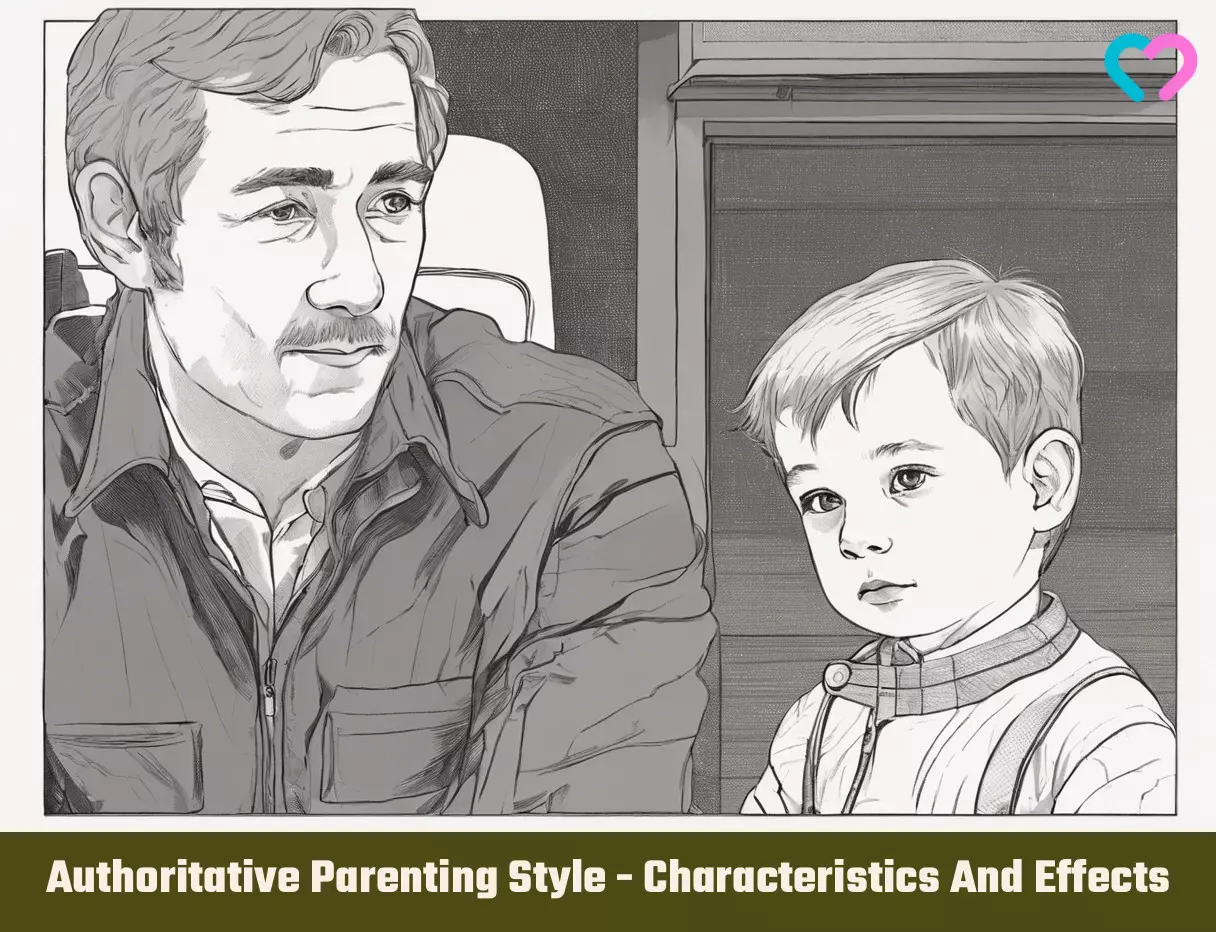
Image: iStock
Dr. Dianna Baumrind, a renowned psychologist, divides parenting styles into four types. The authoritative parenting style is one of them. In this parenting style, parents are child-centric and create a good balance between responsiveness and demandingness. This signifies that authoritative parents expect children to follow the rules they set, but are open to understanding their concerns and problems.

Dr. Baumrind also states that parenting should bring up a healthy child with good abilities and a strong personality. Keeping this point in mind, authoritative parenting is considered one of the best parenting styles.
Read the post to know more about authoritative parenting, its benefits, and the characteristics that make it the most reasonable.
Key Pointers
- Authoritative parents set expectations and support their children while addressing any issues.
- They are involved in their child’s progress, acknowledge limitations and adjust expectations accordingly.
- Constructive feedback is provided alongside encouragement and motivation.
- Authoritarian parenting teaches children to take control of their lives and be accountable for their actions.
- Children raised by authoritarian parents may struggle with self-esteem and decision-making skills.
Define Authoritative Parenting
Authoritative parenting is a style wherein the parents and children communicate amicably. Parents set policies and explain the reason behind the rules to children and seek their opinion.
 Did you know?
Did you know?Dr Baumrind says: “Both autonomous self-williThe ability to make choices and decisions based on one’s desires and thoughts and is not dependent on societal norms and disciplined conformityiA behavioral pattern where one willingly adheres to societal rules, standards, or expectations are valued by the authoritative parent. Therefore, she (the mother) exerts firm control at points of parent-child divergenceiThe differences in opinion between a parent and child but does not hem the child in with restrictions.”
“She uses reason, power, and shaping by regime and reinforcement to achieve her objectives and does not base her decisions on group consensus or the individual child’s desires.” (1)
The Characteristics Of Authoritative Parenting
“Children have never been very good at listening to their elders, but they have never failed to imitate them.” ― James Baldwin
Children imitate their parents and hence loving and happy parents will nurture loving and happy children. Here are the characteristics of authoritative parenting. If you are implementing most of them, you are an authoritative parent.
1. Demanding and responsive

Authoritative parents set expectations and demand their children to meet and respect such expectations. They have clarity on what they want and communicate it to their child. They make sure that the kid is working towards meeting the goal.
Their demands are reasonable as they consider the child’s ability to perform them. While they are strict about the child meeting the goal, they are also responsive to any problems that he faces in the process. They support him in crossing over the barriers.
Example: Your child’s exams are approaching, and you tell him that he needs to top the class. You set this goal because he has been consistently doing well in the exams and you understand his capabilities.
But if he falls ill suddenly, or misses his classes for some reason, you realize that it could be difficult for him to meet his goal. You seek his opinion and help him in achieving his mission or tone down your expectations.
2. Verbal give and take
The parenting style encourages communication. Verbal give and take between parents and children make the tasks easier to perform. As parents fix the house rules and explain the rationale behind them, kids understand why a certain thing needs to be done in a certain way. This will make them follow the rules rather than question them.
Parents also solicit the opinion of their children, thus encouraging them to talk about something that they do not like. An open talk will avoid secrecy in the family.
 Point to consider
Point to considerExample: You form a rule that everyone at home should wake up by 6.30 am. Instead of stopping there, as an authoritative parent you tell your kids why they should get up early in the morning and how it is going to benefit them.
If your child feels it is too early for him to wake up, you try to extract the reason for his reluctance.
3. Involved and understanding
Authoritative parents are involved in the child’s progress and growth. They help the child in his studies and other activities. They assess his strengths and weaknesses, the positives and pain points in his behavior, and the opportunities he has.
As they also understand the limitations, they have an idea of where and when to pause in their expectations. They know when to tell their children to go easy.
Example: Your child has been practicing baseball to get selected in the final team to play in the tourney. You help him strategize, search for information on the internet, draw a plan, and also provide him a balanced diet that is crucial for his physical fitness.
You talk to his coach to understand his strengths and the areas of improvement and support the child in overcoming his shortcomings.
4. Criticism and praise
In an authoritative style, parents do not hesitate to criticize their kids’ behavior or a lackadaisical attitude. They point out the child’s negligence or lack of interest in education or in the activities that he has taken up.
The parents make sure that the child knows if he is not doing things right at home or ignoring his responsibilities.
At the same time, they do not shy away from praising the child for his good deeds or encouraging him to do better.
Example: Your teen daughter has lost focus on her studies and is performing poorly in her class. You talked to her several times but she is adamant. Then you reprimand her for lack of effort, and criticize her attitude.
You observe that she has realized her mistake and is trying to mend her ways. While you do not jump to congratulate her on the change, you do let her know that you have made a note of it. You praise her at the right time as you know that words of appreciation mean a lot.
5. Give freedom but monitor
Authoritative parenting calls for having faith in the child. The parents believe that reasonable freedom needs to be given to their kids for them to be independent and make some minor decisions on their own.
But they are also aware that freedom with no strings attached will be detrimental to the child. Hence they let children be free but monitor their actions lest they go off track (2). Freedom is also age-appropriate and is given in phases.
Example: Your teen son wants to party with his friends late into the night to celebrate his success. You allow him to go but not before asking questions such as where and with whom he is going and when he intends to be back.
If you smell something fishy, you make follow-ups to ensure that he is not on the wrong track.
6. Love and limits
The authoritative parents express their love to their children. This acts as a reassurance for the kids, especially in the teenage years when they are the most susceptible to vices. You also set them the limits, which they cannot cross.
Your love will bind them, and the limits will stop them from walking down a wrong path as they know that you will not approve of their actions. They would take care not to hurt you and deprive themselves of your love.
Example: Your child asks for a bicycle, and you do not want to say no as it is the right age for him to ride. But you are afraid that he might get influenced by his friends to drive rashly. You will make it clear to him that you are happy to buy him a bicycle only if he promises not to exceed the speed limits. You will also monitor if he is keeping his promise or not.
7. Spend time
The families that follow authoritative parenting model spend quality time with each other. Parents ensure that they are not too busy with their work to ignore their children. This makes kids understand the importance of bonding with the family.
Example: You ensure that the mobile phones are put aside, and the TV is switched off during the dinner time as it is an ideal time for the family to bond and know how each other’s day was.
The Effects Of Authoritative Parenting Control On Child Behavior
“Tell me and I forget, teach me and I may remember, involve me and I learn.” ― Benjamin Franklin
This is what happens with children brought up by authoritative parents. They learn because they are involved. Here are some prominent qualities that you can observe in children who grow up in this environment:
- The children are self-confident and independent at accomplishing their tasks.
- They sync into any environment and make themselves comfortable as they are open-minded.
- They are happy and make their surroundings lively.
- Maturity comes to them early in life.
- They are social beings.
- Gender-typical traits are less observant in them.
- They are creative as their parents have been encouraging them to hone their skills.
- They are good learners and speakers.
- They are skilled negotiators.
Authoritative Parenting Skills

Authoritative parents are both strict and flexible. While a lot of areas require parents to put their foot down and impose some serious rules, most other areas see these parents celebrating with their kids and seeing them happy. They take a firm stand at times and expect their kids to behave responsibly. They also show high levels of warmth, and they emphasize the reasons for the rules.
Authoritative parents are likely to have children who will:
Feel free to ask questions about things that they encounter in daily life,
Know how to respond to a particular situation and act accordingly
Take responsibility for their actions and act according to their age.
Benefits Of Authoritative Parenting
Positive parenting does immense good, not just to children but the entire family. Dr. Amita Roy Shah, a mother of two and an adjunct professor at San Jose State University, shares her experience of being an authoritative parent. She says, “For the most part, I am an authoritative parent; however, there are definitely times when the authoritarian style of parenting switches “on” in me. This could be because of my own family-of-origin experiences being raised by the typical Asian Indian authoritarian father. It could also be because I prioritize different socialization goals for my children. I want them to be respectful of their parents and not question everything that they are asked to do. I want them to be raised within the culture of respect (ⅰ).’’ Here are some benefits of authoritative parenting:
1. Harmony at home:
Parents can avoid unpleasant situations with their kids at home as the rules, responsibilities, and expectations are well-known. Children are not rude and parents are not harsh. They have an open talk on contentious issues and have a healthy communication structure rather than shout at each other.
The positive environment at home adds to the development of the child into a better human being, who is sensitive towards others.
2. A balancing act:
There is a balance between love and discipline. Parents take care not to indulge their children so much that they are spoiled. At times when they realize that the balance is being lost, they take care to set it right again.
3. Motivation to perform:

Children are motivated to work hard and attain better results as parents encourage them by being supportive. They recognize the effort the child puts in and measure his success by his sincerity to perform and not by the final result.
4. Assertive and result-oriented children:
Children will learn to be assertive when they grow up. They will know how to say ‘no’ without hurting others because they have seen their parents doing that to them. They take control of the situation as they are confident about dealing with it.
5. Positive disciplining:
Parents do not resort to extreme punishments if the child deviates from the path. But they also do not ignore his deviations. Instead, they discipline him positively in such a way that the message is delivered, but the child is not battered emotionally.
This helps in making the child realize his mistakes.
6. Evolving approach to parenting:
Parenting evolves over the years as the adults learn from their mistakes, and correct their actions. It also changes as the child grows from a toddler to a kid and then to a teenager. There is flexibility in their approach to have age-appropriate expectations.
7. Good performance in school:
Children brought up in this model do well in their education as parents pay attention to their studies and involve themselves by attending activities at school, counseling them during difficult times, and helping them wherever required.
8. Fewer chances of addiction:
Children who grow up in an authoritative set-up are less prone to smoking, drinking, and drug abuse because parents monitor their kids constantly and make efforts to know them better (3). They are also less likely to be involved in anti-social activities. Parents can sense the changes in their behavior when something goes wrong.
Disadvantages Of Authoritative Parenting

Authoritative parents need to be very careful to ensure that the situation is not slipping away. In the absence of a right balance, your parenting could become too lenient or strict, neither of which is good for the child. Here are a few disadvantages of authoritative parenting:
1. Heavy dependence on rules:
The family may become so dependent on rules that they end up having a rule for everything. They would not know what to do if there is no rule written for a particular situation.
2. Low self-esteem:
There is a danger of children having low levels of self-esteem if the parenting balance tilts towards demandingness, and responsiveness comes down.
3. Encourage children to rebel:
Giving children a lot of importance and seeking their opinion on everything could make them feel too important to listen to you. They could develop overconfidence leading to rebellion at home by the time they are teenagers.
4. Additional burden on parents:
Authoritative parenting could put additional burden on parents as they need to set a procedure for every situation. And before doing it, consult their children. There are several discussions before any decision is taken, which could be time-consuming too.
5. Difficult with a wilful child:
This parenting style assumes that children are as cordial as their parents. It need not be the case always as kids could be stubborn, rude, and arrogant because of several external influences such as their friends, and experiences in school and society at large.
A pleasant atmosphere is needed at home for the wholesome development of a child. A loving mother, father, and sibling give the child emotional strength to wade through difficult situations.
Frequently Asked Questions
1. How does authoritative parenting work?
Authoritative parenting works because parents act as positive role models for their children, nurturing and influencing them in various aspects of life. Good practices at home help prevent children from deviating from their path, even in society. Effective communication also helps children develop cognitive and social skills.
2. How is authoritative parenting different from other styles?
Authoritarian parenting differs from other styles of parenting because it maintains a healthy balance between high demandingness and high responsiveness. In contrast, authoritarian parenting emphasizes high demandingness with low responsiveness, permissive parenting emphasizes high responsiveness with low demandingness, and uninvolved parenting has low levels of both demandingness and responsiveness.
3. Why is authoritative parenting considered the best style?
Authoritative parenting is considered the best style because it evolves from a ‘benevolent dictatorship’ when children are infants to a more democratic approach as they age. This approach fosters better psychosocial development and fewer behavioral issues than authoritarian models, as children are taught independence early on.
Additionally, adults raised in authoritative households tend to follow in their parents’ footsteps and implement the same approach with their children, resulting in better outcomes for their offspring.
4. What are some common things that authoritative parents do?
Some common things that authoritative parents do, as identified by the ‘CASA National Survey of American Attitudes on Substance Abuse VI: Teens,’ include monitoring their children’s television and internet usage; restricting their access to some music; keeping track of their whereabouts; expecting honesty; being aware of their academic performance; setting curfews; communicating clear expectations about drug use; prioritizing family dinners; assigning household chores; and ensuring that an adult is present when the teen returns home from school.
5. What is democratic parenting?
Authoritative parenting is also called democratic parenting because the families practice democracy, where children have a say in their affairs.
6. Should my parenting style be rigid?
It is not necessary for your parenting style to definitely fall into one of the four categories. The situation at hand could demand you to deviate from your style. Changing according to the scenario is what authoritative parenting style recommends.
7. What are some common misconceptions about authoritative parenting?
Most people believe that authoritative parenting is similar to authoritarian parenting, involving giving in to a child’s demands, being permissive, not being strict enough, and only works for certain children. However, authoritative parenting is characterized by setting clear expectations and boundaries while providing emotional support and guidance and can be effective for all children.
8. What are the four types of parenting styles?
The four parenting styles are authoritarian, authoritative, permissive, and uninvolved. Authoritarian parents enforce strict rules with little negotiation, leading to well-behaved but potentially aggressive or decision-challenged children. Authoritative parents are known for being nurturing and communicative and setting clear guidelines, resulting in confident, responsible children with high self-esteem. Permissive parenting, warm but with minimal expectations, often acts more like friends, leading to children who may be impulsive and lack self-regulation. Uninvolved parenting provides freedom with minimal interaction, resulting in resilient but possibly emotionally uncontrolled children with academic and social challenges. Each style significantly impacts a child’s development and behavior (1).
In the authoritative parenting style, parents are supportive, nurturing, and responsive yet set limits for their children. Controlling children’s behavior with reasoning or setting rules comes under authoritative parenting. This parenting style has good communication and often asks and listens to explanations from children and makes them understand the importance of following family rules. Parents may not hesitate to criticize or praise their children’s behavior or achievements. There will be freedom with monitoring and limitations in authoritative parenting, and parents will spend more quality time with their children.
Infographic: Characteristics Of Authoritative Parenting
When done right, authoritative parenting may be the perfect blend of strictness and leniency needed to raise a disciplined and independent child. So, if you are new to the parenting game and looking for ways to be a friend and a parent to your child, learn the characteristics of authoritative parenting to try it.
Some thing wrong with infographic shortcode. please verify shortcode syntax
Illustration: Authoritative Parenting Style - Characteristics And Effects

Image: Stable Diffusion/MomJunction Design Team
Learn about the four parenting styles and their effects on you. Discover how your upbringing has shaped who you are today.
Personal Experience: Source
MomJunction articles include first-hand experiences to provide you with better insights through real-life narratives. Here are the sources of personal accounts referenced in this article.
ⅰ. Is the Authoritative Parenting Style Always the Best for Children?https://amitaroyshah.wordpress.com/2014/06/05/is-the-authoritative-parenting-style-always-the-best-for-children/References
- Terrence Sanvictores et al.; (2025); Types of Parenting Styles and Effects On Children.
https://www.ncbi.nlm.nih.gov/books/NBK568743/#:~:text=This%20article’s%20content%20will%20only,how%20parents%20raise%20their%20children. - Prevention by Parenting.
http://www.ecad.net/images/ECAD_documents/Activities_in_member_cities/Baltic_Spice_Alert_project/Handsonhandsoff_Joergen_Larsson.pdf - Parenting to Prevent Childhood Alcohol Use.
https://www.niaaa.nih.gov/publications/brochures-and-fact-sheets/parenting-prevent-childhood-alcohol-use
Community Experiences
Join the conversation and become a part of our nurturing community! Share your stories, experiences, and insights to connect with fellow parents.
Read full bio of Shreshtha Dhar
Read full bio of Bhavana Navuluri
Read full bio of Rebecca Malachi
Read full bio of Apoorva K

















